Israeli forces rescued the bodies of three hostages from Gaza last night, chief military spokesperson Daniel Hagari said.
Mr Hagari identified the three as Shani Louk, Amit Buskila and Yitzhak Gelernter, who he claimed "were murdered by Hamas while escaping the Nova music festival on 7 October and their bodies were taken into Gaza".
Israeli Prime Minister Benjamin Netanyahu praised the military operation and reiterated a pledge to return all the hostages.
"We will bring back all our hostages, whether they are alive or dead," he said in a statement.
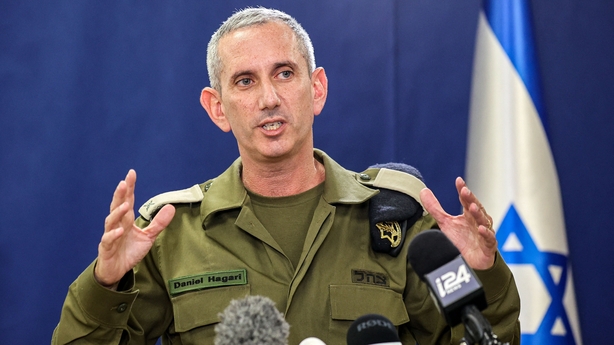
Hamas led an attack on southern Israeli army bases and communities on 7 October, in which around 1,200 people were killed and some 250 taken hostage, according to Israeli tallies. Some 130 hostages remain held in Gaza.
Israel has since launched an air, ground and sea assault on the blockaded Palestinian territory, killing more than 35,000 Palestinians, according to Gaza health authorities.
The bombardment has displaced most of Gaza's 2.3 million population, laid waste to the coastal enclave and caused a deep humanitarian crisis.
It comes as humanitarian workers said they fear that as the war rages on they may be forced to halt operations.
"There are enormous needs" which are bound to grow, while there is "less and less access", said the head of a European charity, speaking to AFP on condition of anonymity.
Aid groups said the humanitarian crisis in the Palestinian territory, where the UN has warned of looming famine, has significantly deteriorated since Israeli troops entered eastern Rafah last week.
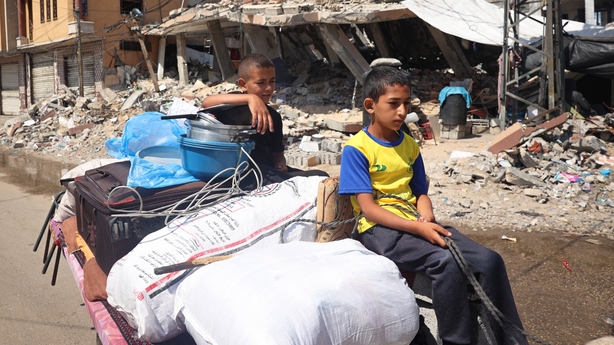
A worker for the Paris-based non-governmental organisation Humanity & Inclusion in the Palestinian territories, requesting anonymity, said: "We can't get our teams out, the security conditions are too unstable."
The Israeli military has launched what it called a "limited" operation, seizing on 7 May the Rafah crossing on the Egyptian border and sparking an exodus of Palestinians seeking safety further north in Gaza.
The Israeli army said today that renewed fighting in Gaza's northern town of Jabalia was "perhaps the fiercest" in over seven months of war.
The army had claimed in early January that it had "completed the dismantling of Hamas' military framework in the northern Gaza Strip" and vowed to focus its war efforts on central and southern areas of the Palestinian territory.
But intense fighting resumed less than a week ago in Jabalia, the second-most populous town in northern Gaza. The army said that already 200 militants had been killed since Sunday.
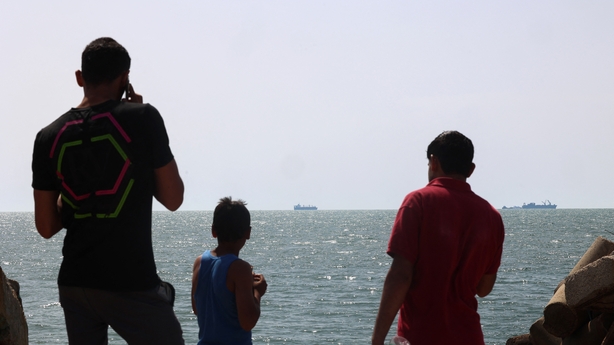
"Hamas was in complete control here in Jabalia until we arrived a few days ago," the Israeli army said, four months after its spokesman Daniel Hagari claimed that militants were operating in the area only sporadically and "without commanders".
The army said it was now operating in the town's refugee camp.
We need your consent to load this rte-player contentWe use rte-player to manage extra content that can set cookies on your device and collect data about your activity. Please review their details and accept them to load the content.Manage Preferences
Before the war, Jabalia was home to the largest refugee camp in Gaza, with more than 100,000 people packed into 1.4 square kilometres, according to the UN.
Images provided by the Israeli army showed soldiers moving through a maze of heavily damaged and deserted buildings.
Aid workers told AFP their organisations had regularly been denied access by Israeli authorities to certain areas or routes.
The Kerem Shalom crossing between Israel and southern Gaza has reopened following a brief closure, but humanitarian groups say Israeli tanks amassing there and repeated Hamas rocket fire have hindered operations.
A trickle of aid has entered via Kerem Shalom in recent days under "great risk, through an area of active hostilities", a UN employee in Jerusalem said.
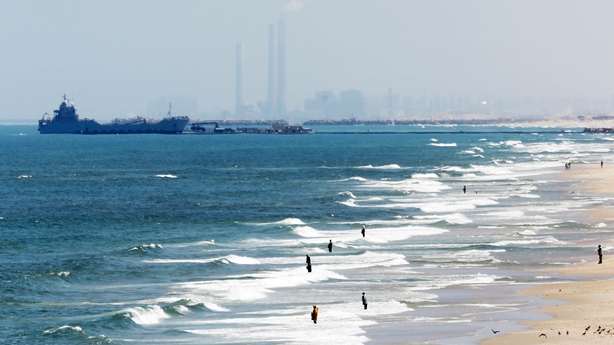
Aid deliveries begin via temporary Gaza pier, US says
Meanwhile, the US military said aid deliveries have begun via a temporary pier in Gaza aimed at ramping up emergency humanitarian assistance to the Palestinian territory.
"Today at approximately 9am (7am Irish time), trucks carrying humanitarian assistance began moving ashore via a temporary pier in Gaza," the US Central Command (CENTCOM) said in a statement, adding that no US troops went ashore.
"This is an ongoing, multinational effort to deliver additional aid to Palestinian civilians in Gaza via a maritime corridor that is entirely humanitarian in nature, and will involve aid commodities donated by a number of countries and humanitarian organizations."
US troops yesterday anchored a long-awaited temporary pier, aimed to boost aid deliveries into war-ravaged Gaza, to a beach in the besieged Palestinian territory, the US military and Israel said.
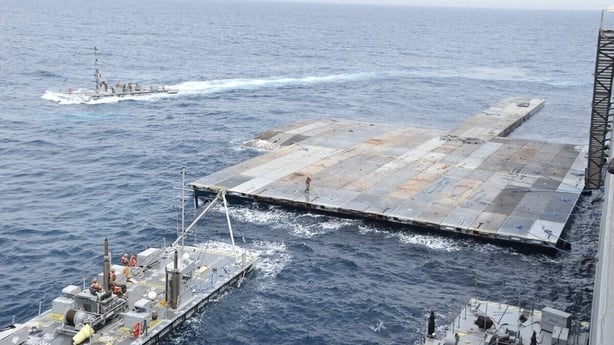
CENTCOM said around 500 tonnes is expected to enter the Palestinian territory in the coming days.
"It's a pretty substantial amount, and it's spread out over multiple ships right now," Vice Admiral Brad Cooper, deputy CENTCOM commander, told reporters in Washington.
US President Joe Biden announced the emergency pier in March to address the humanitarian crisis in Gaza, where the United Nations has warned of famine with virtually the entire population displaced by the Israeli military action in response to the 7 October Hamas attack.
Built at a cost of at least $320 million (€295m), the pier project is extraordinary in that such massive humanitarian efforts by the United States are usually in response to actions by hostile countries, not a US ally.
Read more: Israel to hit back at 'genocide' claims at UN top court
The humanitarian assistance is being screened in Cyprus and loaded by truck.
Once on land, it will "move quickly", being offloaded from the coast into Gaza within hours, Vice Admiral Cooper said, adding that "thousands of tonnes of aid are in the pipeline".
He said that around 1,000 US soldiers and sailors were involved in the operation but that they were only involved in the pier and not in delivery - which will be handled through the UN.
"There will be no US military boots on the ground in Gaza," he said.

Israel 'recklessly oblivious' to regional implications of war - Martin
Tánaiste Micheál Martin has said that Israel is "behaving in a shocking way" and is "recklessly oblivious" to the regional implications of the war.
Speaking on RTÉ's Morning Ireland, he said that "the international community needs to step up".
"I think the International Court of Justice has stepped up the pressure (on Israel) and their provisional conclusions and recommendations and findings when South Africa initiated the case under the Genocide Convention," Mr Martin said.
"And now that's going to take some time, the substantive case, will take some time and Ireland will intervene legally on that in terms of trying to broaden the terms on which genocide is decided and we will make a serious, robust legal intervention on that.
"I think Israel is behaving in a shocking way in terms of its recklessly oblivious to the implications of this regionally and the potential for escalation."

